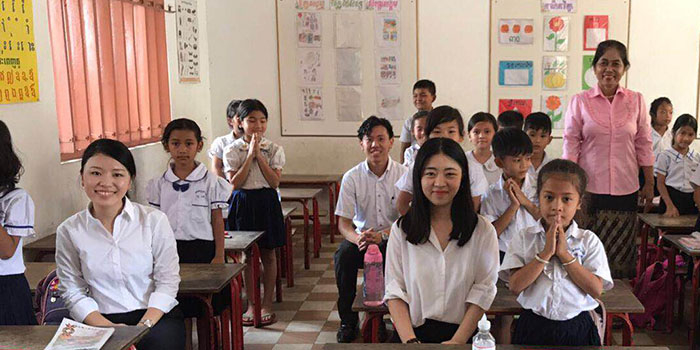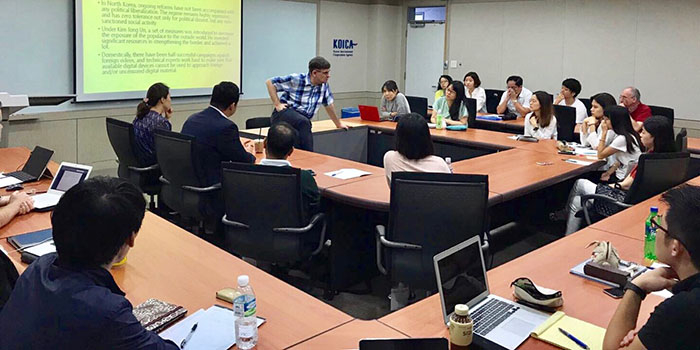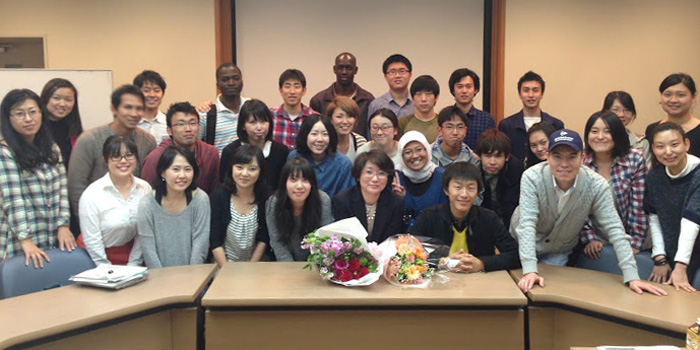I conducted my internship under the supervision of His Excellency Mr. Sothea Lim, Director General of Policy and Planning Department in the Ministry of Education, Youth and Sport (MoEYS) in Cambodia from September 4th to 30th, 2017. The main tasks of my internship were the following three: (i) review the education policy and regulation in MoEYS, and conduct interviews to government officers at the national, provincial and district levels by visiting government offices; (ii) visit international organizations and conduct interviews to education specialists who are in charge of education projects; (iii) carry out the research related to the private tutoring in secondary schools in Cambodia. The detailed internship activities are mentioned below.
First of all, I reviewed Cambodian education policy and education related project documents to grasp a broad view of the current situation of education in the country, by which I was able to establish a clear view of education issues, education development strategies, and education development goals in Cambodia. Further, in order to understand the process of the education policy implementation by the Cambodian government, I visited the Provincial Offices of Education(PoE) and District of Education(DoE). Through the interviews to government officers in MoEYS, PoE and DoE, I found that even though the government has developed a relatively complete education policy, it is not an easy task to implement those policies in practice. There are still large numbers of education issues remaining in many aspects in Cambodia including government budget for the education sector, teacher training system, school management condition, and government regulation for non-formal education. Thanks to this experience, I was fortunate to broaden my knowledge and perception of the current situations of the Cambodian education, and also have a direct communication with government officials rather than only relying on literature review.
 Secondly, I was honored to visit UNESCO, UNICEF and World Bank Cambodia Offices, and conducted interviews to education specialists to learn more about the role and operation of each international organization in Cambodia. What impressed me the most was that all the experts have answered my questions patiently and provided me with valuable advices, from which I was informed on the international organizations working environment, development working contents, how they cooperate with government, and how I can prepare myself to work at the international level. My vision has been expanded and the knowledge and information that I obtained has raised my career expectation from the perspective of individual to government and international level. By taking advantages of this opportunity, I have formed an actual image of international organizations in my mind, which sent me a powerful message that I am determined to work in the international organizations, not being afraid of any challenges I will encounter on the road.
Secondly, I was honored to visit UNESCO, UNICEF and World Bank Cambodia Offices, and conducted interviews to education specialists to learn more about the role and operation of each international organization in Cambodia. What impressed me the most was that all the experts have answered my questions patiently and provided me with valuable advices, from which I was informed on the international organizations working environment, development working contents, how they cooperate with government, and how I can prepare myself to work at the international level. My vision has been expanded and the knowledge and information that I obtained has raised my career expectation from the perspective of individual to government and international level. By taking advantages of this opportunity, I have formed an actual image of international organizations in my mind, which sent me a powerful message that I am determined to work in the international organizations, not being afraid of any challenges I will encounter on the road.
Thirdly, I conducted my research on the topic “Analysis of Private Tutoring in Secondary Education in Cambodia”. In order to collect data, I developed a classroom observation tool, applied questionnaires to 100 students and 20 teachers, and conducted interviews to 5 students and 4 teachers in secondary schools in Phnom Penh City with the arrangement of MoEYS. I was able to learn plenty of lessons during this field research. Among them, I would like to emphasize two points. In the first place, research should be carefully considered and realistically planned. My questionnaire was well-connected with the exact professional words; however, I had to make several revisions to fit the level of some of my respondents, mostly those students in secondary school. Secondly, communication skills need to be paid attention all the time. I realized that I could obtain unexpected and meaningful answers in a respected way of communication during the interview. In other words, interviews schemed on caring for the emotional and respect for the culture of interviewees may always yield to great results.

This was my first time to conduct the internship and field research in a developing country. Consequently, what I have experienced is such a great fortune in my whole life. What I have seen, heard and felt contributed to build a great confidence to my research, study, future career and daily life.
It was an excellent opportunity to conduct the internship in MoEYS, in Cambodia. I benefited a lot not only academically, but this internship has been very practical and productive for my research career and administrative skills development. I sincerely appreciate the kind support received from His Excellency Mr. Sethea Lim and his staff in Directorate General of Policy and Planning. Finally, I would also like to express my deepest gratitude to my academic advisor, Professor Keiichi Ogawa for arranging such a very valuable internship opportunity.
Authored by Kexin Wang (Master Student)
Related Link
Ministry of Education, Youth and Sports in Cambodia
Related


 Secondly, I was honored to visit UNESCO, UNICEF and World Bank Cambodia Offices, and conducted interviews to education specialists to learn more about the role and operation of each international organization in Cambodia. What impressed me the most was that all the experts have answered my questions patiently and provided me with valuable advices, from which I was informed on the international organizations working environment, development working contents, how they cooperate with government, and how I can prepare myself to work at the international level. My vision has been expanded and the knowledge and information that I obtained has raised my career expectation from the perspective of individual to government and international level. By taking advantages of this opportunity, I have formed an actual image of international organizations in my mind, which sent me a powerful message that I am determined to work in the international organizations, not being afraid of any challenges I will encounter on the road.
Secondly, I was honored to visit UNESCO, UNICEF and World Bank Cambodia Offices, and conducted interviews to education specialists to learn more about the role and operation of each international organization in Cambodia. What impressed me the most was that all the experts have answered my questions patiently and provided me with valuable advices, from which I was informed on the international organizations working environment, development working contents, how they cooperate with government, and how I can prepare myself to work at the international level. My vision has been expanded and the knowledge and information that I obtained has raised my career expectation from the perspective of individual to government and international level. By taking advantages of this opportunity, I have formed an actual image of international organizations in my mind, which sent me a powerful message that I am determined to work in the international organizations, not being afraid of any challenges I will encounter on the road.




